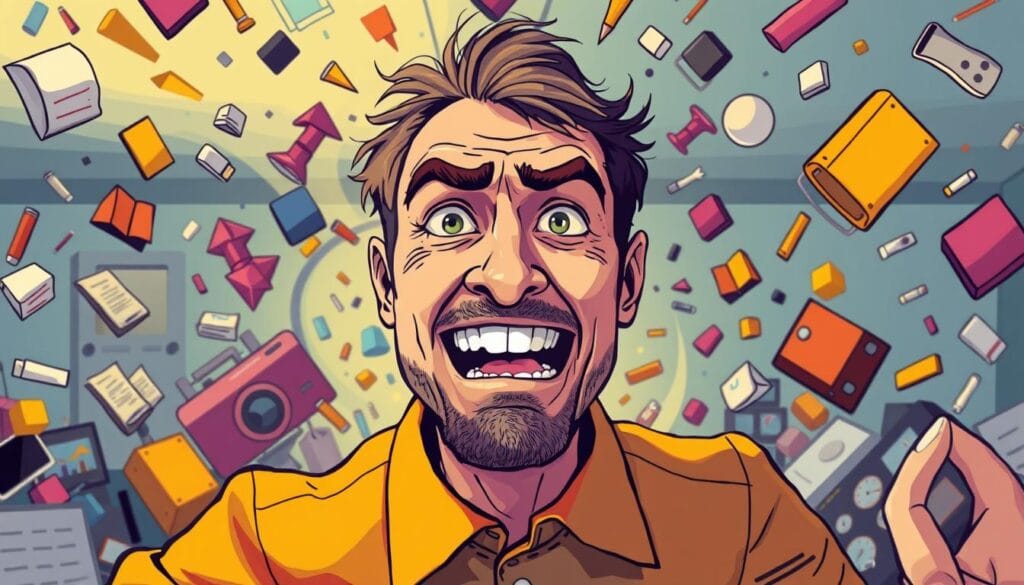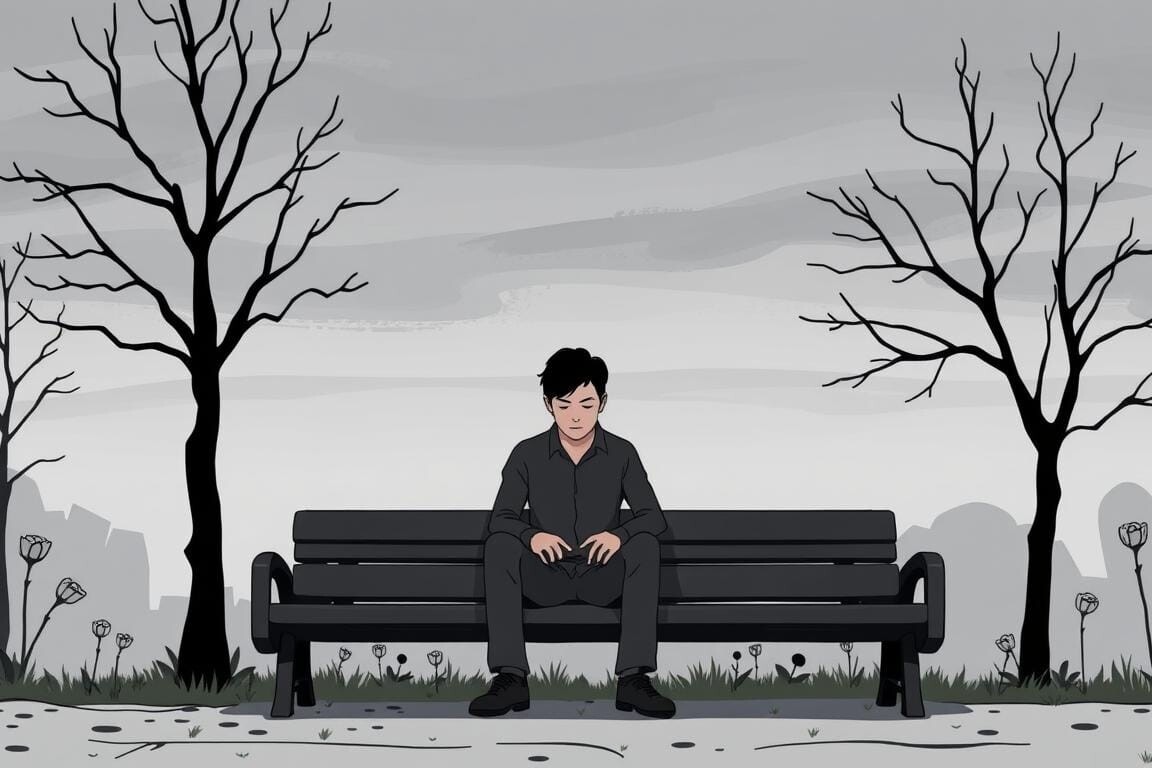Manic depression, also known as bipolar disorder, affects men deeply. It causes big mood swings. Men can feel very high and then very low.
While it hits both men and women, men’s symptoms can be different. They need special care.
Dr. Chandril Chugh, a mental health expert, will talk about manic depression in men. He will cover signs, symptoms, and treatment options. This info can help you or a loved one with manic depression.
Table of Contents
ToggleUnderstanding Manic Depression in Men
Manic depression, also known as bipolar disorder, is a complex mental health condition. It causes significant mood swings in individuals. Men with bipolar disorder can feel very energized and happy during mania. Then, they can feel very sad and tired during depression.
These mood swings can greatly affect a man’s daily life and relationships. They can also impact his overall well-being.
What is Manic Depression?
Manic depression, or bipolar disorder, is a chronic condition. It involves alternating periods of mania and depression. During mania, a person feels very upbeat and full of energy.
Depressive episodes are marked by sadness, loss of interest, and feelings of worthlessness. The types of bipolar disorder vary in severity and duration of mood swings.
Symptoms of Manic and Depressive Episodes
Symptoms of manic episodes in men with bipolar disorder include:
- Increased energy, activity, and restlessness
- Heightened mood, feeling “on top of the world”
- Reduced need for sleep
- Racing thoughts and rapid speech
- Impulsive or risky behavior
Symptoms of depressive episodes may include:
- Persistent feelings of sadness, hopelessness, and emptiness
- Loss of interest in previously enjoyable activities
- Changes in appetite and sleep patterns
- Fatigue and lack of energy
- Difficulty concentrating and making decisions
- Feelings of worthlessness and guilt
- Recurrent thoughts of death or suicide
Understanding the types of bipolar disorder is crucial. It helps in managing and treating the condition effectively.
Prevalence and Impact of Manic Depression on Men
Manic depression, also known as bipolar disorder, affects about 2.8% of adults in the U.S. It impacts both men and women, but seems more common in men.
Men with manic depression face big challenges. They might struggle to keep a job, build lasting relationships, and take care of their health. High mood and energy in manic episodes can mess up their life. Sadness and fatigue in depressive episodes make things worse.
Studies show that 82.9% of people with bipolar disorder had moderate to serious problems last year. Also, 17.1% had moderate issues. In the U.S., 2.9% of teens aged 13-18 have bipolar disorder, with 2.6% severely affected.
It’s key to spot manic depression early and treat it well. This way, men can get their lives back on track. They can improve their relationships and succeed in work and personal life.
Causes and Risk Factors of Manic Depression in Men
The exact causes of manic depression, also known as bipolar disorder, are not fully understood. Research suggests that both biological and genetic factors, and environmental and lifestyle factors, may contribute to it in men.
Biological and Genetic Factors
Imbalances in brain chemicals, like serotonin, dopamine, and norepinephrine, are linked to manic depression. Neurological differences in the brain’s structure and function may also play a role. Genetic factors are important, as the condition is more common in those with a family history of bipolar disorder.
Environmental and Lifestyle Factors
Stressful life events, like trauma or major life changes, can increase the risk of manic depression in men. Substance abuse, certain medical conditions, and sleep disruptions may also contribute to the onset of the disorder.

Understanding the causes of manic depression is complex. It often involves a mix of these factors. Knowing the unique risk factors helps men and their healthcare providers create a good treatment plan.
Manic depression in men
Manic depression, or bipolar disorder, shows up differently in men than in women. It’s important to know the signs of manic and depressive episodes. This helps in treating the condition early and effectively.
Recognizing the Signs of Manic Episodes in Men
Men with bipolar disorder act differently during manic episodes. They feel more energetic and restless. They might also act impulsively or recklessly.
They could think they’re more important than they are. They might not need to sleep much and talk a lot. They might even take risks, like spending too much money or being too risky in their relationships.
Identifying the Symptoms of Depressive Episodes in Men
Depressive episodes in men with bipolar disorder are different. They feel sad, hopeless, and worthless. They might not want to do things they used to enjoy.
They could also sleep too much or too little, eat less, or have trouble focusing. Sadly, they might even think about suicide during these times.
It’s key to recognize these symptoms to get help quickly. Understanding these challenges helps us improve mental health for men with bipolar disorder.

Diagnosing Manic Depression in Men
Diagnosing manic depression, or bipolar disorder, in men is complex. Doctors like psychiatrists or psychologists use interviews, medical history, and special tools to diagnose. They also check for other health issues that might cause symptoms.
The DSM-5 outlines the criteria for diagnosing manic depression. It includes both manic and depressive episodes. Men with bipolar disorder may show symptoms differently than women. It’s key for doctors to know these differences.
Key Steps in Diagnosing Manic Depression in Men
- Clinical Interview: Doctors will talk in-depth to understand symptoms, mood, and daily life impact.
- Medical History: Reviewing past health and treatments is crucial to rule out other causes.
- Standardized Assessment Tools: Doctors use mood questionnaires or scales to measure symptoms.
- Physical Examination: A physical check-up is done to find any underlying health issues.
- Laboratory Tests: Blood tests or other tests may be done to check for medical causes.
Doctors use a detailed approach to diagnose manic depression in men. This ensures an accurate diagnosis and a proper treatment plan. Early and accurate diagnosis is vital for managing this complex condition.

Treatment Options for Manic Depression in Men
Men with manic depression, also known as bipolar disorder, get help in many ways. They use medicines and talk therapy. The goal is to control the ups and downs of the condition and help them feel better over time.
Medication Management
Medicines are key in treating manic depression in men. They might take mood stabilizers like lithium or anticonvulsants. They might also take antidepressants and antipsychotics. These medicines work together to manage the condition’s different phases.
- Mood stabilizers like lithium, valproic acid, and lamotrigine help control mood swings and prevent relapse.
- Antidepressants are used carefully, often with a mood stabilizer or antipsychotic, to treat depression.
- Antipsychotics such as quetiapine, risperidone, and lurasidone help with manic episodes.
Psychotherapy and Counseling
Psychotherapy and counseling are also important. They help men with manic depression learn to cope better. They improve emotional control and overall well-being.
- Cognitive-behavioral therapy (CBT) helps men change negative thoughts and behaviors.
- Interpersonal therapy improves relationships and communication, which can be affected by mood swings.
- Family therapy helps the individual and their loved ones manage the condition and stay healthy.

Every man with manic depression gets a treatment plan that fits them. This plan might include a team of doctors, psychologists, and therapists. It’s important to talk often with the healthcare team to manage symptoms and adjust treatments.
Lifestyle Changes and Self-Care Strategies
Living with manic depression, or bipolar disorder, is tough for men. But, making lifestyle changes and practicing self-care can help a lot. By focusing on your well-being, you can keep your mood stable and improve your life.
Getting enough sleep is key. A regular sleep schedule helps your body stay in rhythm and prevents mood swings. Stress management, like meditation or yoga, also helps handle stress and anxiety.
Eating well and staying active are important too. A healthy diet and regular exercise boost your mood and help with sleep. They also reduce anxiety and depression.
Having a strong support network is vital. Joining a support group or talking to a mental health expert can help. Sharing with loved ones also gives you the support you need.
Managing manic depression needs a mix of medical care, lifestyle changes, and self-care. By focusing on your well-being and using these strategies, you can manage your condition better. This improves your life quality.
Coping with Manic Depression as a Man
Living with manic depression can be tough for men. They often face stigma and high expectations about mental health. It’s key to build a strong support system and find ways to cope.
Dealing with Stigma and Societal Expectations
Men with manic depression might feel like they must hide their struggles. But, seeking help is a sign of strength, not weakness. Challenging these expectations can help you feel empowered and improve your mental health.
Building a Support System
Having a network of supportive people can greatly help. This could be through support groups, therapy, or friends and family. A strong support system offers understanding and resources to manage your condition.
Remember, coping with bipolar disorder as a man means tackling unique challenges. With a strong support system and effective coping strategies, you can manage your mental health and live a fulfilling life.
Conclusion
Manic depression, also known as bipolar disorder, is a complex mental health issue. It can greatly affect men’s lives. Understanding the signs and symptoms is key.
There are many treatment options and self-care strategies. Men can manage their symptoms and improve their well-being.
Men should seek professional help and build a strong support network. They must also address any societal stigma or expectations.
With the right treatment and support, men can thrive and live fulfilling lives. Remember, you are not alone. There are resources and strategies to help you manage this condition and live your best life.
Manic depression is a summary of manic depression in men. By taking a proactive approach to your mental health, you can overcome the challenges of managing bipolar disorder as a male.
The key takeaways on managing bipolar disorder in males are to seek help, build a support system, and prioritize self-care. With the right support and strategies, you can learn to manage your condition and live a fulfilling life.
FAQ
What is manic depression?
Manic depression, also known as bipolar disorder, is a mental health issue. It causes big mood swings. People can feel very high and full of energy, then very low and tired.
How does manic depression present differently in men?
Manic depression affects both men and women, but differently. Men might find it hard to keep a job or build relationships. They also struggle with their health.
What are the common signs and symptoms of manic and depressive episodes in men with manic depression?
In manic episodes, men feel very energetic and might act impulsively. They might also think they’re very important. In depressive episodes, they feel sad, hopeless, and don’t enjoy things they used to.
How is manic depression in men diagnosed?
Diagnosing manic depression in men is tricky. Symptoms can look like other mental health issues. Doctors use interviews, medical history, and special tools to figure it out.
What are the treatment options for manic depression in men?
Treatment for manic depression in men includes medicine and therapy. Medicine helps control mood swings. Therapy helps men learn to cope and feel better.
How can men with manic depression manage their condition through lifestyle changes and self-care?
Men with manic depression can feel better by sleeping well, managing stress, eating right, and exercising. Having a strong support system is also key.
How can men with manic depression cope with societal stigma and expectations?
Men with manic depression face stigma and expectations. It’s important for them to seek help and support. This helps them deal with their condition and find ways to cope.
Source Links
About The Author

Medically reviewed by Dr. Chandril Chugh, MD, DM (Neurology)
Board-Certified Neurologist
Dr. Chandril Chugh is a U.S.-trained, board-certified neurologist with expertise in diagnosing and managing neurological disorders, including migraines, epilepsy, Parkinson’s disease, and movement disorders. His clinical focus includes evidence-based neurological care and patient education.
All content is reviewed for medical accuracy and aligned with current neurological guidelines.




